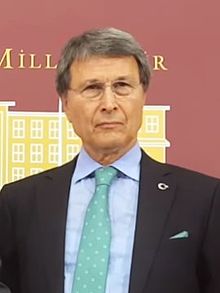Yusuf Halaçoğlu
Yusuf Halaçoğlu (* 1949 in Kozan , Adana ) is a Turkish historian and politician of the İyi Parti ("Good Party"). From 1993 to 2008 he was the chairman of the Türk Tarih Kurumu (Turkish Historical Society).
School, studies and work
Halaçoğlu graduated from high school in 1967 and graduated from Istanbul University in 1971 . Three years later he became a research assistant there and received his doctorate in 1978 on the settlement policy in the Ottoman Empire . In 1989 Halaçoğlu completed his habilitation and was appointed head of department in the State Archives of the Prime Minister's Office of Turkey . In 1990 he was promoted to deputy director of the archive. Two years later he moved to Marmara University as a professor . There he was appointed deputy rector six months later. In 1993 he was appointed head of Türk Tarih Kurumu.
Halaçoğlu had to resign from the leadership of the Turk Tarih Kurumu in July 2007 due to controversial information about the ethnic origin of the Kurdish Alevis . In 2008, Yusuf Halaçoğlu was released. In January 2011, Halaçoğlu joined the Nationalist Movement Party (MHP).
For the parliamentary elections in 2011 he entered parliament as a member of the MHP . He succeeded in doing this in 2015, both in June and in November . On March 10, 2017, Halaçoğlu was expelled from the party in the course of the MHP's dispute over the direction of the constitutional referendum in 2017 . He has been a member of the İyi Parti since October of the same year.
Controversial positions
Halaçoğlu was often involved in the debate about the Armenian genocide . There he represented the official line of the Republic of Turkey , which denies the genocide recognized by numerous states . In May 2004, the Winterthur public prosecutor opened a case against him under the anti-racism penal norm after he denied the genocide of the Armenians during a speech in front of the Turkish Association in Winterthur. He came under fire in 2007 when he argued that some of the Kurdish Alevis were converted Armenians . Around 30 percent of the Kurds are of Turkmen origin and the left-wing armed organization TIKKO (Workers and Peasants Liberation Army of Turkey) and the PKK are largely of Armenian origin.
Publications (selection)
- (with Hikmet Özdemir, Kemal Çiçek, Turan Ömer, Çalık Ramazan) The Armenians. Exile and resettlement. Manzara, Pfungstadt 2012, ISBN 978-3-939795-15-5 .
Web links
Individual evidence
- ↑ İki bağımsız vekil MHP'li oldu , Article of the Milliyet of January 29, 2011
- ↑ Eyewitness from Appenzell | NZZ . In: Neue Zürcher Zeitung . December 23, 2006, ISSN 0376-6829 ( nzz.ch [accessed September 27, 2018]).
| personal data | |
|---|---|
| SURNAME | Halaçoğlu, Yusuf |
| BRIEF DESCRIPTION | Turkish historian and former head of the Türk Tarih Kurumu |
| DATE OF BIRTH | 1949 |
| PLACE OF BIRTH | Kozan (Turkey) |
